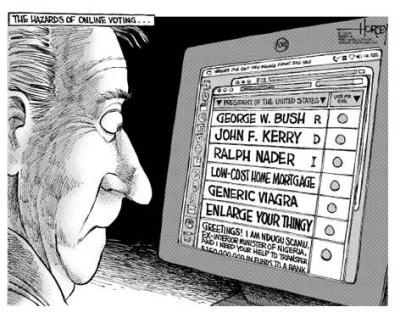We saw it in Angola, Kenya and most recently in good-ol’ Zimbabwe. Any real democracy rests on a free and fair electoral process. However, as Africa has shown us time and time again, elections could mean the begin of civil war with no democratic resolution in sight.
Perhaps, if the manner in which elections were carried out would be changed, leaders would be appointed with ease and according to the will of the people.
I took a look at the concept of e-voting to see if it presented a plausible alternative for African elections. E-voting is when states use electronic technologies to either cast or count votes.
So the idea is for the voting process to work just like a trip to the ATM, you would cast your vote using touchscreen technology or a number of buttons. All ballots would be tallied electronically. This could prove to be faster and more effective than the current manual counting.
There are a number of advantages to this electoral system. With computers adding up the votes, there is less room for human error. Audio can be introduced for blind voters and zoom in capabilities would cater for those with poor vision. The screen can be displayed in a number of languages and polling stations can never run out of printed ballots.
Voter turn-out in Zimbabwe sits at less than 20%. This is due to, among many more reasons, the fact that many Zimbabweans have left their country in seek of refuge as where. With e-voting citizens could potentially place their vote from anywhere in the world if the necessary online networks and links were enabled.
South African youth are becoming more computer literate and are becoming regular Internet users. However their political engagement and involvement calls for great improvement. Creating a link between electronic media and voting could increase the number of youth voters in national and provincial elections.
However, e-voting is far from being flawless, especially in Africa. Computer literacy, for both the voters and the facilitators, would be a major hurdle. Electronics do not do away with room for human error as these computers are programmed and used by humans, who are at times impartial.
To fund such a project, the private sector would need to be called on board. Voters would be correct in questioning just how impartial the system would be if it is powered by companies with political clout and business interests.
Thabo Mbeki has been seen as good for business and a strong economy. The same would be hard to say about Jacob Zuma, as some have noted. It is totally plausible that an e-voting system programmed, run and managed by these interest would present Mbeki as the next president even if it were against the will of the people.
Even in America where e-voting has been in use, it is still under much scrutiny and heavily criticised. Democracies work only when the people trust that their vote has been counted fairly and freely. This can never happen with a system with so many flaws.


I don’t know about how effective e-voting would be. I think if a politician just paid the right hacker, he could change election results with a single click of a mouse. I think there would have to be a pilot project first to test it in smaller communities. If it could erdicate queues when election-season comes around, well that’s an added bonus.